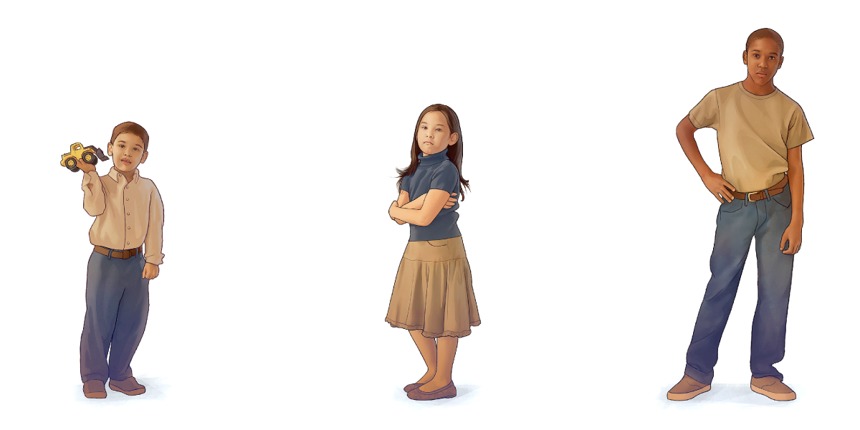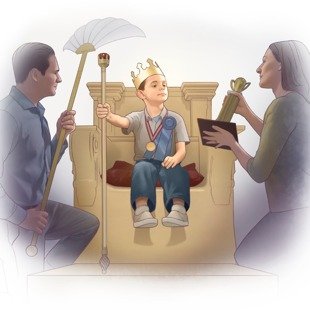What do you think, Whatever Happened to Discipline?
Another shared articles I saw online

In recent decades, family life in Western lands has changed dramatically. At one time, parents were in charge and children followed their lead. Now, in some households it seems to be the other way around. For example, consider the following scenarios, all of which are based on typical situations.
While at the store with his mother, a four-year-old boy reaches out for a toy. His mother tries to dissuade him. “You have enough toys already, don’t you?” Too late, she realizes that she should not have ended on a question. “But I want it!” the boy whines. Fearing a tantrum—his usual ploy—Mom gives in.
A five-year-old girl interrupts her father as he is talking to another adult. “I’m bored,” she announces. “I want to go home!” Her father stops mid-sentence, stoops down to his daughter, and asks in a soothing voice: “Just a few more minutes, Sweetie—OK?”
Once again, 12-year-old James has been accused of shouting at his teacher. James’ father is upset—not at his son but at the teacher. “She’s always picking on you,” he says to James. “I’m going to report her to the school board!”
The preceding scenarios are imaginary, but they are hardly far-fetched. They illustrate a real problem that exists in homes where parents tolerate children’s rudeness, cave in to their demands, and “rescue” them from the consequences of their misconduct. “It is increasingly common to see parents relinquishing authority to young children,” says the book The Narcissism Epidemic. “Not that long ago, kids knew who the boss was—and it wasn’t them.”
Of course, many parents do strive to teach their children proper values, not only by setting a good example but also by giving firm but loving correction when needed. Nevertheless, parents who recognize the value of doing so are, as the book quoted earlier puts it, “swimming against the cultural tide.”
How did things get to this point? Whatever happened to discipline?
Parental Authority Weakens
Some say that a weakening of parental authority began in the 1960’s, when so-called experts were urging parents to be more easygoing with their children. They said: ‘Be a friend, not an authority figure.’ ‘Praise is better than discipline.’ ‘Rather than correct the bad, catch your children in the act of doing good.’ Instead of striking a balance between commendation and correction, experts seemed to imply that reprimanding children would damage their fragile emotions and cause them to resent their parents later in life.
Before long, experts were also heralding the virtues of self-esteem. It was as if the secret to good parenting was suddenly discovered, and it was simply this: Make your children feel good about themselves. Of course, it is important to instill confidence in children. But the self-esteem movement took things to an extreme. Experts told parents: ‘Avoid using negative words such as no and bad.’ ‘Keep telling your children that they are special and that they can be anything they want to be.’ It was as if feeling good was more important than being good.
Parents offer excessive praise to their son as he sits on a throne

The self-esteem movement has done little more than make children feel entitled
In the end, some say that the self-esteem movement has done little more than make children feel entitled, as if the world owes them. It has also left many young ones “ill prepared for the inevitable criticism and occasional failure that is real life,” says the book Generation Me. One father quoted in that book put it this way: “There is no self-esteem movement in the work world. . . . If you present a bad report at the office, your boss isn’t going to say, ‘Hey, I like the color paper you chose.’ Setting kids up like this is doing them a tremendous disservice.”
Shifting Opinions
Over the decades, parenting practices have often reflected the ever-shifting opinions of humans. “Discipline keeps changing,” writes educator Ronald G. Morrish. “It reflects changes in our society.” * It is so easy for parents to be, as the Bible puts it, “tossed about as by waves and carried here and there by every wind of teaching.”—Ephesians 4:14.
Clearly, the current wave of relaxed discipline has had negative effects. It has not only weakened parental authority but also left children without the guidance they need to make good choices and approach life with genuine confidence.
Is there a better way?
for more just follow me
This post is great but the spanish tag should be used only when the post is written in spanish, avoid using this tag if your post is not in spanish.
Please do not keep using this tag if you don´t write in spanish or we will be forced to flag your content.
Recomendación, usa el tag spanish cuando el contenido sea escrito de manera parcial o total en español, el tag steem cuando tu publicación habla de la criptomoneda, el tag steemit cuando hables de la plataforma, el tag introduceyourself para tu primer publicación en la que te presentas y el tag photography cuando las fotografías sean de tu propiedad. Todo esto es para evitar publicar contenido clasificado como plagio o abuso en el futuro.
Steemit es una plataforma en la que se recompensa el trabajo original y propio. Si existe alguna duda sobre cómo puedes evitar el plagio y abuso favor de leer las publicaciones informativas de @lince.
Para cualquier aclaración los medios de comunicación son por correo a [email protected] o en los chats de discord y steemit.chat
okay you will get it in spanish